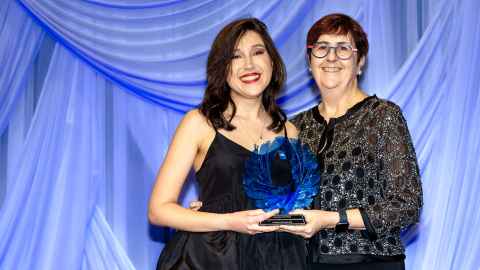Meet the law student leading change for neurodivergent New Zealanders
8 October 2025
Kartini Clarke, named after an Indonesian activist, has turned her experience with ADHD into advocacy.

When Raden Adjeng Kartini read the journals and magazines her brother sent home from Europe in the late 1800s, she discovered that in some countries, women had the same educational opportunities as men. The Javanese noblewoman, born in 1879, turned that revelation into a lifelong mission to champion women’s rights and education in Indonesia.
Her story would later inspire the name, and spirit, of University of Auckland law student Kartini Clarke, this year’s recipient of the Blues Award for Most Outstanding Contribution in Service and Leadership.
“I was named after an Indonesian heroine and advocate of women’s rights and female education,” says Kartini. “She fervently fought for women’s emancipation and, despite her status as an aristocrat, went against the grain by challenging the hierarchical norms of the time.”
Like her namesake, Kartini is a passionate advocate. As CEO of the Young Neurodiversity Champions, she mentors young leaders, lobbies Members of Parliament, and works with government agencies to improve access to ADHD diagnosis for thousands of New Zealanders.
Diagnosed with ADHD at 19, the fifth-year law student joined the Young Neurodiversity Champions to improve the education system to ensure “no neurodivergent kid gets left behind”.
“There are around 14 of us in total, and we share our lived experiences with schools and businesses across the country. We promote a strengths-based approach to education, and some of the champions, particularly those of us who were late-diagnosed, juxtapose that with some of the negative challenges we dealt with before we knew what was up in our brains.”
Kartini recently spoke overseas on the topic of neurodiversity, its biological impacts and potential impacts on mental health. She has also spoken to students, teachers, law firms, human resources staff, airlines, and many other industries over the years.
School became worse over time ... I was totally disengaged from my education by Year 13.
Before she was diagnosed with ADHD, Kartini says she thought she was “fundamentally flawed”.
“I developed time management issues as I aged, and my grades were pretty inconsistent depending on what subject I was doing and my interests. School became worse over time for me. There was a high expectation to perform, and it came with the added pressure of teenage socialisation, the sensory environment of the classroom and feeling completely misunderstood by both peers and teachers.”
Needless to say, Kartini’s school years were challenging.
“I was totally disengaged from my education by Year 13. However, I was passionate about my special interests, like politics and mental health advocacy. That kept me afloat.”
Once Kartini started to understand her neurodiversity, the core beliefs she had harboured—that she was flawed and broken—started to dissipate. She also began to understand how she learns best, and during her time at Auckland Law School, she’s undertaken much of her studies online or in small classes.
“I work unconventionally, but it works for me. My ADHD also has its perks, I can learn things really fast and work well under urgency.”
Other perks of ADHD for Kartini include being passionate and relentless, an outside-the-box thinker, and having the ability to recognise patterns quickly.
She says alternative education pathways for rangatahi should be funded to empower them to utilise their strengths and prevent premature disengagement from education.
“I think children should be screened for neurodiversity at the beginning of primary school, and their parents should be equipped with culturally sensitive knowledge if it’s found.”
Kartini also wants to see affordable diagnosis, better vocational training within the public mental health sector and more clinicians who can diagnose neurodiversity in a timely manner.
After graduating, she hopes to pursue a career in criminal prosecution.
“As a public speaker, litigation feels like a natural next step,” she says. “I also think my neurodiversity will be immensely helpful when interacting with both survivors and defendants.
“Unfortunately, our community has more contact with the criminal justice system, as many as 40 percent of prisoners have ADHD. I want to ensure justice is met, and maybe this is idealistic, but I want to see change from the inside out.”
Media contact:
Sophie Boladeras, media adviser
M: 022 4600 388
E: sophie.boladeras@auckland.ac.nz